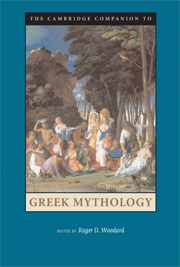Book contents
- Frontmatter
- Introduction: Muthoi in Continuity and Variation
- Part I Sources and Interpretations
- Part II Response, Integration, Representation
- 8 Greek Myth and Greek Religion
- 9 Myth and Greek Art: Creating a Visual Language
- 10 Mythic Landscapes of Greece
- 11 Politics and Greek Myth
- 12 Ovid and Greek Myth
- Part III Reception
- Bibliography
- Index
10 - Mythic Landscapes of Greece
from Part II - Response, Integration, Representation
Published online by Cambridge University Press: 28 March 2009
- Frontmatter
- Introduction: Muthoi in Continuity and Variation
- Part I Sources and Interpretations
- Part II Response, Integration, Representation
- 8 Greek Myth and Greek Religion
- 9 Myth and Greek Art: Creating a Visual Language
- 10 Mythic Landscapes of Greece
- 11 Politics and Greek Myth
- 12 Ovid and Greek Myth
- Part III Reception
- Bibliography
- Index
Summary
The survival of a substantial body of ancient Greek literary production - together with roughly two centuries of modern scholarship - has left no doubt that the ancient Greeks had a very rich mythic imagination, constantly preoccupied with the deeds of gods and heroes. Especially influential was the cluster of tales narrated in Homeric poetry, which over the centuries consistently served as the basis for Greek education. Myth was so pervasive in Greek life and thought that in the fourth century BCE Plato sought to control its telling. In the second book of the Republic, Plato’s Socrates severely criticized the fictitious stories told by Homer, Hesiod, and other poets (even though Plato himself employed myth in his philosophical dialogues). Socrates argued that the majority of myths should be left out of the ideal state and its curriculum for the young, unless they communicated noble ideas (Republic 376C-377E). Real Greek cities, however, tolerated and celebrated a variety of mythical traditions, including those whose messages were less than uplifting, making it clear that Greece was fundamentally a culture of myth. But did the Greeks care to envisage the highly varied landscape configurations that hosted their myths? Was Greece a culture of landscape in addition to being a culture of myth? .
- Type
- Chapter
- Information
- The Cambridge Companion to Greek Mythology , pp. 305 - 330Publisher: Cambridge University PressPrint publication year: 2007
- 5
- Cited by

